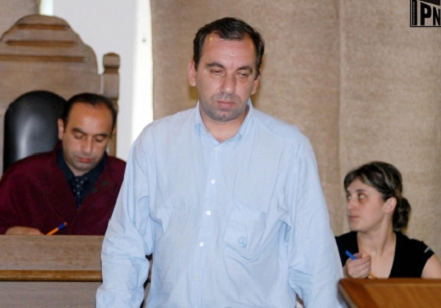Main witness in Girgvliani murder case changes testimony

A former Ministry of Internal Affairs senior official has admitted he previously lied to the court and has given a new testimony relating to the torture and murder of Sandro Girgvliani in 2006.
In Tbilisi City Court yesterday, Oleg Melnikov signed a confession statement that acknowledged he was guilty of providing a fake testimony to officials.
Melnikov highlighted the plea bargain had been prepared by former head of the Constitutional Security Department David Akhalaia in exchange for a smaller sentence. In return Melnikov promised he would prove the situation in Court.
Melnikov said the accused former high officials made a plan on how to cover up the case and suppress public protest, so decided to arrest four employees of the Ministry of Internal Affairs. Melnikov noted former Chief Prosecutor Zurab Adeishvili and ex-President Mikheil Saakashvili agreed with this plan.
According to the plan, the four MIA authorities would be arrested for a short period and then released, Melnikov said.
In his testimony, Melnikov said despite the fact he was not employed by the Ministry during this period, a monthly salary had been transferred into his bank account.
After yesterday’s hearing, prosecutor Irakli Nadareishvili announced Melnikov’s new testimony confirmed those accused of murdering Girgvliani were responsible.
Following yesterday’s court hearing, Georgian Prime Minister Irakli Garibashvili promised justice would be restored and the investigation into Girgvliani’s death would be "impartial” and "objective”.
"As Prime Minister, I promise that justice will be restored to every citizen. I welcome every person to cooperate with the Government and through an impartial investigation, and once and for all our citizens and the world will know the truth of the harsh reality that existed in our country for years,” Garibashvili told journalists.
Girgvliani’s murder case generated huge public interest, which fuelled criticism of the former government, in particular ex-Minister of Internal Affairs Vano Merabishvili, who is currently charged with obstructing the investigation.
At the time, Akhalaia and Merabishvili, who is now in prison, and several other ex-high officials were linked to the case. According to the plan, Melnikov was one of the four MIA officials who were accused of committing the crime and sentenced to seven to eight years in prison.
Then former president Mikheil Saakashvili ordered the men’s sentences to be slashed in half and they were later released from prison ahead of schedule.
Girgvliani, who was head of the United Georgian Bank's Foreign Department, was tortured and killed on January 28, 2006. He had been severely attacked and his body was found with multiple injuries near Okrokana cemetery.
According to different sources, the 28-year-old’s death was connected with a situation that developed at Sharden Bar, an elite Tbilisi bar, earlier that evening.
It is alleged former Inspector General of the Ministry of Internal Affairs Vasil Sanodze was holding his birthday party with colleagues at the bar, accompanied by Merabishvili’s wife Tako Salakaia. She was a friend of Girgvliani's girlfriend, Tamar Maisuradze, who was also present at the party. Sources alleged Maisuradze was the reason why Girgvliani had an argument with MIA spokesperson Guram Donadze and other people at the table. Later that evening Girgvliani was found dead.
Merabishvili and ex-Defense Minister and former prison system Chief Bacho Akhalaia were found guilty of their role in the murder case are currently in prison. In addition, Saakashvili and Akhalaia were sentenced for their role in the crime in absentia.
In April 2011 the European Court of Human Rights in Strasbourg partially satisfied a lawsuit filed by the Girgvliani family against the Georgian government, and stated the investigation into Girgvliani’s death "clearly lacked the requisite, independence, impartiality, objectivity and thoroughness”.
The Court ordered the Georgian government to pay €50,000 compensation to the Girgvliani family for moral damage.
However, the Court also accepted the Georgian government’s arguments and stated despite the plaintiff’s claims, Article 2 of the European Convention on Human Rights and Fundamental Freedoms had not been violated.
 Tweet
Tweet  Share
Share